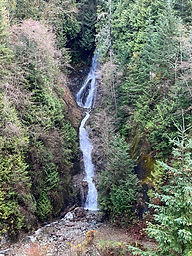Earth Day: April 22, 2023
- kc dyer
- Apr 23, 2023
- 2 min read
A Message From Your Climate Action Committee

The very first Earth Day was celebrated in 1970, and since that time the movement has grown into a world-wide environmental call to action.
This year, The Watershed celebrates Earth Day by encouraging residents of Lions Bay to connect with the environment. The first step, always, is to care for the place we all live, and so today we feature a submission from the Lions Bay Climate Action Committee. Want to find out more? Read on!
Protecting Lions Bay's Most Valuable Asset
The most valuable asset in Lions Bay is, without a doubt, our forested watershed, which is 15 times larger than the 'built up' area of the village and encompasses 20 square kilometres of mixed conifer forest, streams, wildlife habitat and recreational trails on a rugged mountainside topography.
The forest and watershed surrounding our village play and important role in maintaining the character of Lions Bay and the welfare of residents. Together they moderate the impact of rainfall, runoff velocity, soil erosion and risk of landslides. They enhance the village water supply by increasing the rate and volume of water infiltration throughout the entire catchment area, maximizing the recharge of our underground aquifer and regulating flow in our creeks which provide the entire water supply of Lions Bay. In parallel our forest and watershed contribute to the health and quality of life of residents and add thousands of dollars to the value of Lions Bay homes every year.
Historically, there have been many wildfires in the Sea to Sky Corridor. Clear evidence of these fires can be seen in the charred bark of old trees throughout our watershed. Four years ago firefighters worked all night to contain a small forest wildfire just north of the village and recurring wildfires on Cypress mountain have worried Lions Bay residents over the past decade.
Most alarming was the 2019 wildfire at Strip Creek a few kilometres south of the village, which burned four hectares in three hours. This fire was difficult to control because of the steep terrain and wind off the ocean – both of which are commonplace in Lions Bay. Despite the combined efforts of several fire departments and provincial water bomber aircraft, this relatively small fire burned for three days and cost several hundred thousand dollars to extinguish.
While wildfires have occurred on the BC coast throughout history, the Wildfire Service, fire science, and the increasing frequency of wildfires in BC suggest that climate change, current building practices, regional development, and the growing popularity of outdoor recreation will increase the risk of wildfires in the Sea to Sky Corridor and our forested watershed. Fortunately, the Wildfire Service, BC organizations, local volunteers, and neighbouring municipalities have relevant knowledge and experience that Lions Bay can build upon to reduce the risk that climate change and wildfire pose to our watershed, homes, and quality of life.
The Lions Bay Climate Action Committee will be working on ways to raise community awareness of the threats posed by climate change and wildfire, to plan and recommend simple cost-effective actions to reduce the risk to our watershed, homes and quality of life. To suggest ways we might protect our watershed or offer to help, you can attend a regular CAC meeting virtually or in person, or email us at: lionsbayclimateaction@gmail.com


Thank you, Karen, for including this important submission from the Lions Bay Climate Action Committee.
Protection of our local environment and concern for the real threats to our community brought about by Climate change is an issue on which we can all agree.